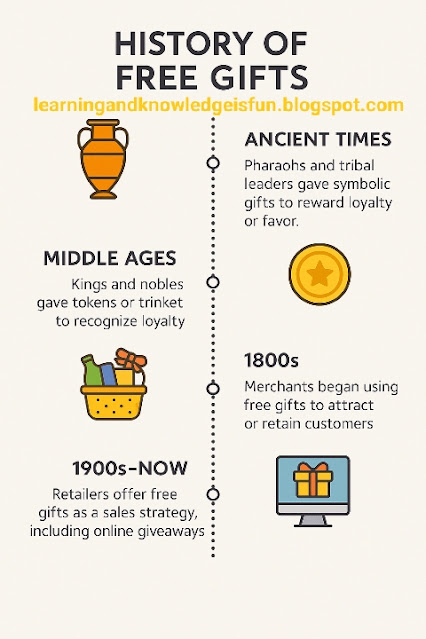The history of free gifts goes way back and mixes marketing, psychology, and even ancient traditions. Let’s unwrap it like a present! 🎁✨
🎁 The History of Free Gifts
🏺Ancient Times: Gifts for Loyalty or Favor
In ancient Egypt, pharaohs gave jewelry or land to officials as a reward — kind of like royal free gifts!
Tribal leaders and chiefs across Africa, Asia, and the Americas often gave symbolic items (like feathers, beads, or carved stones) to allies or warriors to strengthen loyalty.
📜Middle Ages: Tokens and Trinkets
Medieval kings and nobles gave coins, badges, or rings — especially to warriors or loyal subjects.
During festivals or religious ceremonies, small offerings or tokens were given to participants — the early version of “party favors.”
🧺 1800s: Gifts in Business Begin
American and European merchants began giving free items with purchases to attract repeat buyers.
Example: soap companies in the U.S. started offering collectible cards or coupons to encourage loyalty.
The first well-known brand to do this was B.T. Babbitt Soap Company (mid-1800s) — they gave out promotional trinkets.
🛍️ 1900s: Free Gifts Go Mainstream
Cereal companies (like Kellogg’s) gave toys in cereal boxes (1910s) — one of the most famous being the “cereal box toy surprise.”
Gas stations in the 1950s–60s gave free glasses or plates with fill-ups — a tactic to build brand loyalty.
“Free gift with purchase” became a strong marketing strategy in retail (perfumes, cosmetics, kitchenware).
💻 2000s–Now: Digital Free Gifts
Online shopping introduced freebies like eBooks, PDFs, app trials, or bonus items with orders.
Subscription boxes offer welcome gifts (first-month bonuses).
Influencers and brands now use giveaways and free samples to attract engagement and loyalty.
💡 Why Free Gifts Work:
Psychology:
People feel a sense of obligation to return the favor (called the reciprocity principle).
Marketing:
Increases customer trust, makes them feel valued, and encourages return visits.
Fun factor:
Everyone loves a surprise — especially when it's free!
Ok,that's it all..hope you enjoy reading at this page..
comment anything below,share this page to anyone and spread the knowledge to the world..
cya all in next post,Love You All..




No comments:
Post a Comment